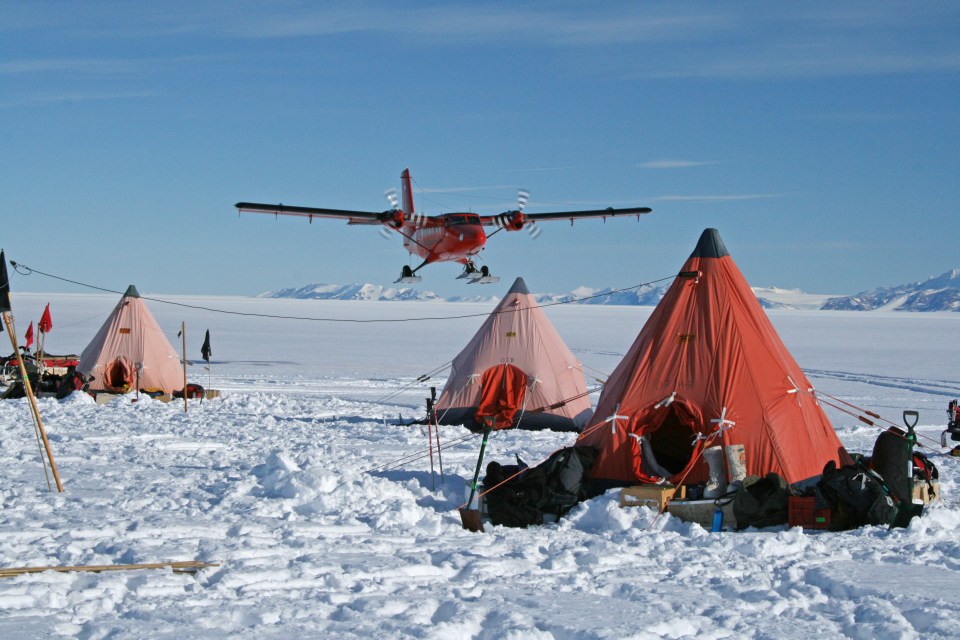CASH-STRAPPED Brits can earn over £50,000 a year by applying for a range of new jobs, but they would have to move to one of Earth’s the most extreme environments.
The roles are currently up for grabs at the most southerly location on the globe: Antarctica.
Jam Press/BASA Twin Otter plane flying past a field camp in Antarctica[/caption]
Jam Press/BASAn expedition to the Hinge Zone near the Halley Research Station[/caption]
Jam Press/BASA maintenance technician at the Rothera Research Centre on Antarctica[/caption]
British Antarctic Survey (BAS) is looking for new employees to work at its research stations on the icy continent.
Carpenters, chefs, electricians, plumbers, boating officers, plant operators and more are encouraged to apply for jobs that offer the opportunity of a lifetime.
Successful applicants will contribute to science which is critical for understanding our changing world.
Applicants should check the specific job advert for the relevant closing date with contracts starting anytime between May and September this year.
Salaries start at £29,000/year with a benefits package.
A Health and Safety Advisor is currently advertised with an annual salary of £51,200 to £56,400.
All living expenses are covered – including accommodation, food, travel, specialist clothing, tools and training.
The first batch of the jobs – including a diving officer, meteorological observer and ocean scientist – are now on the BAS website.
Eloise Saville is a carpenter at Halley VI Research Station, which sits on an ice shelf and is the furthest south of the BAS facilities.
This is her first season in Antarctica.
She said: “This job is unlike anything I’ve ever done before.
“I scrape ice off wood, drive skidoos and build things in one of the most extreme places on Earth, yet it’s funny how quickly it all feels normal.
“The people here are some of the most interesting and adventurous that I’ve met and yet they’re normal too! If I’d known this was an option earlier I’d have been working my way down here all along.
“It’s not just cold, it’s cool!”
British Antarctic SurveyThe British Antarctic Survey one a trip through the Southern Ocean[/caption]
GettyA range of new jobs have been advertised based on the world’s ice continent[/caption]
Ben Norrish, Head of Vehicles, joined BAS in 2001 as a Mobile Plant Technician.
He has since returned to Antarctica many times having spent 16 seasons living and working on the ice.
He said: “There’s something special about Antarctica and the people that adventure there that gets under your skin.
“No matter how many times you go, when you step off the ship or aeroplane into Antarctica, you look up and take in where you are.
“That feeling of being in an amazing place is the same now as it was the first time.
“I would say to anyone who’s even a bit curious about what it’s like to live on the ice, take the leap and apply for the job of a lifetime – you won’t regret it and you don’t know where it might take you.
Olivier Hubert, who is now a Catering Manager at BAS, was a chef in a Michelin-starred restaurant before deciding he was ready for a change of scene.
He has over-wintered at Rothera Research Station and spent a summer at Halley VI Research Station.
Oliver said: “Being a chef in Antarctica is a very different experience to anything I’ve ever done before.
“Meals are such an important part of life down south – they’re the anchors to the day so the pressure is on to create interesting and nutritious meals with limited supplies.
“But it’s such a privilege to cook for the team that becomes your family while you’re there – plus the views from the kitchen are pretty epic.”
BAS is a world leader in polar research and operations.
Its research highlights the fragility of the Earth’s frozen environments and what that means for humans and the planet.
It provides the UK’s national polar capability by operating research stations, aircraft and the Royal Research Ship Sir David Attenborough, supporting science at the poles and securing the UK’s presence in Antarctic affairs.
AFPAntarctica is the most extreme environment on Earth, where temperatures plunge to minus 90 degrees[/caption]
PA:Press AssociationAntarctica is home to roughly 44 million penguins[/caption]

